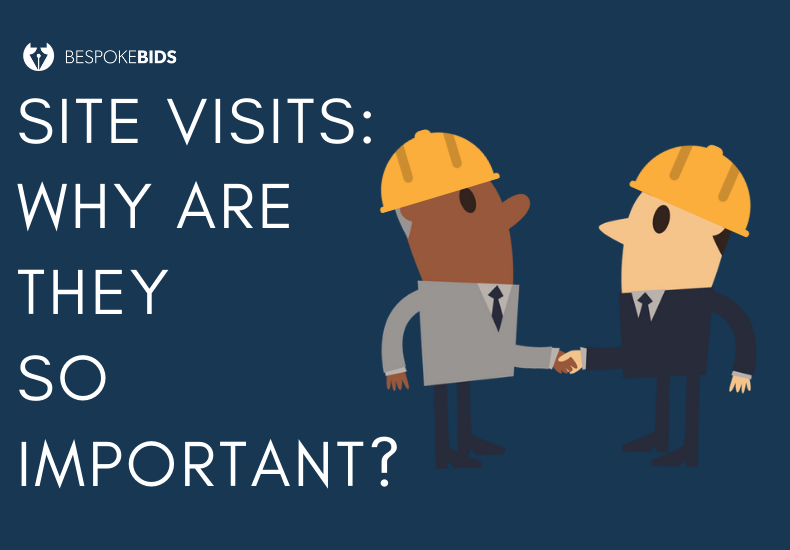
Site visits are an unfortunate yet necessary evil in the world of bid management. While many of us deplore the necessity, site visits can nevertheless be an extremely valuable tool in ensuring bidding success. This blog looks at the reasons for site visits, why you should care and most importantly how to benefit.
No one enjoys site visits…

Put simply, if there is a site visit or a bid presentation, optional or not, You Must Go.
The buyer will be keeping a keen eye on which organisations show up and will remember when they come to mark your bid. It’s a great opportunity therefore to make a lasting impression.
Depending on your specific tender, there may be questions asked which you will only be able to answer if you have visited the site.
Eg. Having visited our site, where would you suggest is the best location for 5 new CCTV cameras?
If you get to a question like this and didn’t attend, you may as well give up. The buyer won’t care for a bid from a supplier that isn’t invested.
What’s the point though?

So you’re going, but why? What are the real reasons for site visits? How can I gain from it?
Make your face known to the relevant people
The main reason for site visits is simply to make your face known. Putting a face to a name can have a huge subconscious impact on buyers whenever they come to marking your bid. If you made a good impression on your site visit with friendly faces and nicely pressed trousers, the buyer might just be more inclined to favour you.
Get to know the buyer
Not only do site visits offer the buyer a chance to get to know you, but also and perhaps more importantly for your bid, you can get to know them.
Learn as much as you can about the project or service, the reasons behind it and the biggest issues the buyer expects to face. These factors can then be woven directly into your bidding narrative which will become more personal and relevant as a result.
The buyer will like that you not only provide a one-size-fits-all service, but that you have actually considered how you will fit in with them.
Check out the competition
Quite apart from your own supplier-buyer relations, site visits also offer excellent opportunities to scope out your competition and see precisely who or what you’re up against.
If you frame your reconnaissance properly, you will be able to gather a great deal of information which can inform how you will go about writing your tender and formulating your pricing.
If you know there are particular weaknesses in certain rivals, make sure to ghost these in your own responses. Similarly, if you have weaknesses in comparison, make sure to mitigate these before your competitor has chance to bring them up.
What if there isn’t one advertised?

Don’t jump for joy just because the buyer didn’t / forgot to advertise a site visit. You’re not in the clear just yet. Rather than sitting back and letting it be, use the opportunity to get one over on your competition and request one.
Without looking like a bit of a teacher’s pet, this will show you as a supplier who actually cares about winning. The buyer will remember you especially for your initiative and investment in the opportunity.
So always ask. They can only say no.
What do I do now I’m here?

So you decided to go (good), and now you’re wondering what on earth to do now you’re here:
Ask questions about the bid
Your site visit offers an excellent opportunity to ask the buyer questions about the bid and the procurement as a whole. Depending on the rules of the tender and certainly in the public sector, they shouldn’t answer your questions, but you never know.
If they do answer your questions, you may be able to gain quite an edge on your competition in discovering information that no one else has access to. It’s sneaky, but whatever works. Right?
If you’re in at 5, have a quick scan of the sign-in book
Another sneaky, but no less useful tactic is to have a quick scan of the sign-in book on your way in or out. Especially if you’re meeting the buyers late in the day, the sign in book should be full of competitor names for you to take note of.
As we mentioned earlier, knowing who your competition is can drastically inform how you approach your bid.
Look for client pain points to mention in your bid
We also mentioned earlier about the benefits of getting to know your buyer. With this in mind, it is also important to learn and understand their pain points. Where are they struggling most? What is the real reason behind this procurement?
It’s a relatively old sales tactic, but can work wonders in your bidding. Once you know what hinders your client, you can formulate a bid which directly addresses these issues making it as relevant and appealing as possibly to your buyer.
Did you enjoy this post?
Check out one of our latest blogs on tendering in the public sector.
Follow Bespoke Bids on Linkedin to keep up with our day-to-day operations. We post live tenders, tips and tricks and more.


